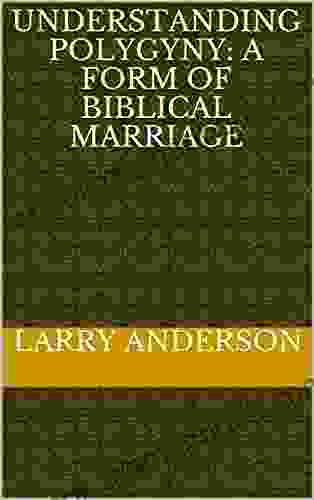Understanding Polygyny in Biblical Marriage: A Comprehensive Exploration

Polygyny, the practice of a man having multiple wives, is a marriage structure that has been present in various cultures throughout history. In the biblical context, polygamy was a common practice among the patriarchs and kings of ancient Israel. This article aims to provide a comprehensive understanding of polygyny in biblical marriage, exploring its historical, cultural, and religious roots, as well as its implications and challenges.
Historical Context
Polygyny emerged in ancient Israel as a response to specific social, economic, and political factors. During the patriarchal period, large families were seen as a source of strength and prosperity. Men with multiple wives could increase their lineage and secure their position within the tribe. Polygyny also provided a means of forming alliances with other families and clans.
4 out of 5
| Language | : | English |
| File size | : | 1672 KB |
| Text-to-Speech | : | Enabled |
| Screen Reader | : | Supported |
| Enhanced typesetting | : | Enabled |
| Print length | : | 54 pages |
| Lending | : | Enabled |
With the rise of the Israelite monarchy, polygamy became a symbol of royal power and wealth. Kings often married multiple women to establish political connections and demonstrate their dominance. For example, King Solomon had hundreds of wives and concubines, reflecting his vast kingdom and influence.
Cultural Factors
Polygyny in biblical times was deeply influenced by cultural norms and practices. In ancient Israel, women had limited rights and were often seen as property of their husbands. Polygyny allowed men to control more women and increase their reproductive potential.
Moreover, polygamy was considered a way to provide for women who might otherwise remain unmarried or widowed. By marrying multiple women, men could ensure that all of them had a husband and a place within the community.
Religious Perspectives
The biblical text reflects a complex and evolving view of polygamy. While it acknowledges the existence of polygamous marriages, it also raises concerns about the potential for abuse and inequality.
In the Torah (the first five books of the Hebrew Bible),polygamy is not explicitly forbidden, but there are passages that suggest a preference for monogamy. For example, the Ten Commandments state that a man should not covet his neighbor's wife, implying that a man should have only one wife.
However, later biblical texts, such as the book of Proverbs, criticize the practice of polygamy, warning against the dangers of jealousy, rivalry, and strife within a polygamous household.
Motivations and Benefits
There were several motivations for men to enter into polygamous marriages in biblical times. These included:
- Increasing family size: Polygamy allowed men to have more children, which was seen as a blessing and a source of strength.
- Securing alliances: Marrying women from different clans or tribes could help form political alliances and strengthen bonds between families.
- Demonstrating power: Polygamy was a symbol of wealth and status, particularly among kings and rulers.
- Providing for women: Polygamy could provide a home and security for women who might otherwise remain unmarried or widowed.
Challenges and Consequences
While polygamy could provide certain benefits, it also presented several challenges and consequences. These included:
- Rivalry and jealousy: Multiple wives within a household could lead to jealousy, rivalry, and conflict.
- Inequality: Polygamy could create an imbalance of power between wives, with some wives being favored over others.
- Economic strain: Supporting multiple wives and their children could put a significant strain on a man's resources.
- Emotional challenges: Managing multiple relationships and meeting the emotional needs of all wives could be emotionally taxing.
Decline of Polygyny
Over time, polygamy became less common in ancient Israel. Several factors contributed to its decline, including:
- Religious reforms: The rise of monotheism and the influence of prophets who condemned polygamy led to a gradual shift towards monogamy.
- Influence of Roman law: The Roman Empire, which ruled over Judea during the first century AD, prohibited polygamy.
- Changing social norms: As society evolved, monogamy became the more accepted and desirable form of marriage.
Polygyny was a complex and multifaceted practice in biblical times. Its origins lie in historical, cultural, and religious factors, and it served various purposes, including increasing family size, forming alliances, and demonstrating power. However, polygamy also posed challenges and consequences, such as rivalry, inequality, and emotional strain.
Over time, polygamy declined in ancient Israel due to religious reforms, the influence of Roman law, and changing social norms. Today, monogamy is the predominant form of marriage in most societies around the world.
4 out of 5
| Language | : | English |
| File size | : | 1672 KB |
| Text-to-Speech | : | Enabled |
| Screen Reader | : | Supported |
| Enhanced typesetting | : | Enabled |
| Print length | : | 54 pages |
| Lending | : | Enabled |
Do you want to contribute by writing guest posts on this blog?
Please contact us and send us a resume of previous articles that you have written.
 Top Book
Top Book Novel
Novel Fiction
Fiction Nonfiction
Nonfiction Literature
Literature Paperback
Paperback Hardcover
Hardcover E-book
E-book Audiobook
Audiobook Bestseller
Bestseller Classic
Classic Mystery
Mystery Thriller
Thriller Romance
Romance Fantasy
Fantasy Science Fiction
Science Fiction Biography
Biography Memoir
Memoir Autobiography
Autobiography Poetry
Poetry Drama
Drama Historical Fiction
Historical Fiction Self-help
Self-help Young Adult
Young Adult Childrens Books
Childrens Books Graphic Novel
Graphic Novel Anthology
Anthology Series
Series Encyclopedia
Encyclopedia Reference
Reference Guidebook
Guidebook Textbook
Textbook Workbook
Workbook Journal
Journal Diary
Diary Manuscript
Manuscript Folio
Folio Pulp Fiction
Pulp Fiction Short Stories
Short Stories Fairy Tales
Fairy Tales Fables
Fables Mythology
Mythology Philosophy
Philosophy Religion
Religion Spirituality
Spirituality Essays
Essays Critique
Critique Commentary
Commentary Glossary
Glossary Bibliography
Bibliography Index
Index Table of Contents
Table of Contents Preface
Preface Introduction
Introduction Foreword
Foreword Afterword
Afterword Appendices
Appendices Annotations
Annotations Footnotes
Footnotes Epilogue
Epilogue Prologue
Prologue Samira Mahmoodi
Samira Mahmoodi D E Malone
D E Malone Marvin A Henry
Marvin A Henry Steven Grey
Steven Grey Jay Heinrichs
Jay Heinrichs Stashia Jeanette
Stashia Jeanette Jane Bryant Quinn
Jane Bryant Quinn Frank Bettger
Frank Bettger J Alexander Greenwood
J Alexander Greenwood P S Scott
P S Scott Susan Senator
Susan Senator Ugo Bardi
Ugo Bardi Harold Wittaker
Harold Wittaker Thomas Davis
Thomas Davis Janet Berliner
Janet Berliner Judit Kormos
Judit Kormos Marie James
Marie James Chelsea Thomas
Chelsea Thomas Scotty Ratford
Scotty Ratford Cameran Blake
Cameran Blake
Light bulbAdvertise smarter! Our strategic ad space ensures maximum exposure. Reserve your spot today!
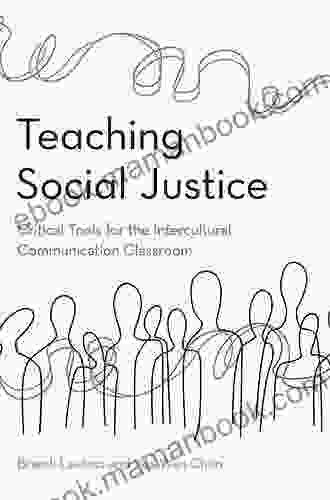
 Frank MitchellCritical Tools for the Intercultural Communication Classroom: Empowering...
Frank MitchellCritical Tools for the Intercultural Communication Classroom: Empowering...
 Cruz SimmonsYears Of Soul Songs Love And Tender Musings: A Comprehensive Exploration of...
Cruz SimmonsYears Of Soul Songs Love And Tender Musings: A Comprehensive Exploration of...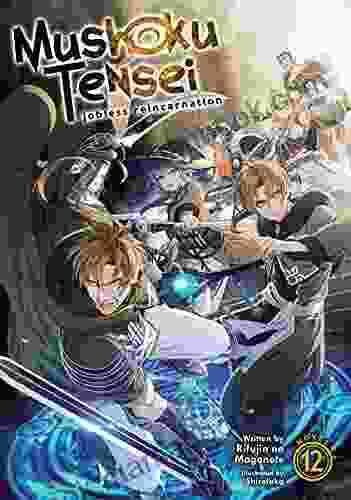
 Stuart BlairMushoku Tensei: Jobless Reincarnation Light Novel Vol. 12: Full Review and...
Stuart BlairMushoku Tensei: Jobless Reincarnation Light Novel Vol. 12: Full Review and... Kirk HayesFollow ·8.1k
Kirk HayesFollow ·8.1k Greg FosterFollow ·18.9k
Greg FosterFollow ·18.9k Evan SimmonsFollow ·4.6k
Evan SimmonsFollow ·4.6k Quincy WardFollow ·19.1k
Quincy WardFollow ·19.1k Charles ReedFollow ·13.9k
Charles ReedFollow ·13.9k Bill GrantFollow ·11.8k
Bill GrantFollow ·11.8k Desmond FosterFollow ·19.5k
Desmond FosterFollow ·19.5k Quentin PowellFollow ·14.8k
Quentin PowellFollow ·14.8k
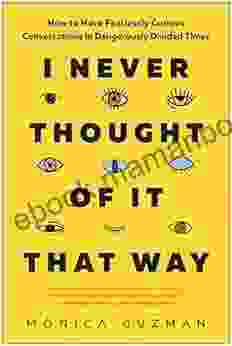
 Ross Nelson
Ross NelsonHow to Have Fearlessly Curious Conversations in...
In a world increasingly polarized by...

 Isaac Mitchell
Isaac MitchellFew Things to Keep in Mind for a Successful Introduction...
Writing an series...

 Dallas Turner
Dallas TurnerThe Ultimate Easy Key for Beginners: A Comprehensive...
Welcome to the world of...

 Mitch Foster
Mitch FosterMy First Origami Kit: Ebook Downloadable Material...
Origami, the...
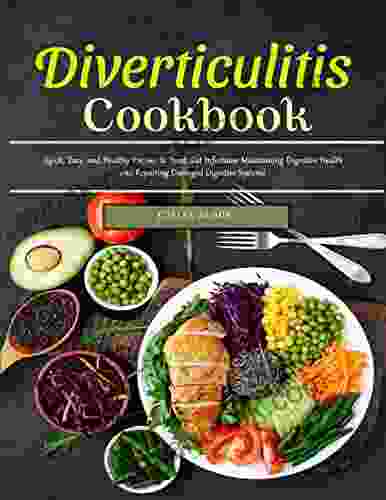
 Tony Carter
Tony CarterQuick, Easy, and Healthy Recipes to Treat Gut Infections...
Gut infections are a common problem that can...

 Adrian Ward
Adrian WardThe Mechanism Behind Italian Poetry In English: Poesia...
The world of...
4 out of 5
| Language | : | English |
| File size | : | 1672 KB |
| Text-to-Speech | : | Enabled |
| Screen Reader | : | Supported |
| Enhanced typesetting | : | Enabled |
| Print length | : | 54 pages |
| Lending | : | Enabled |


